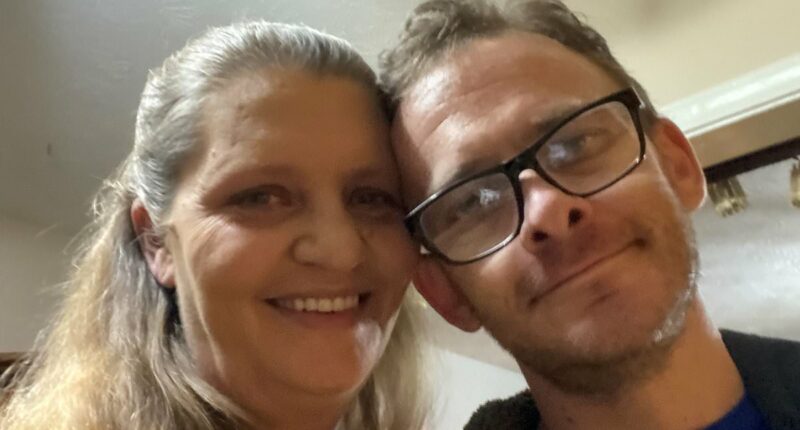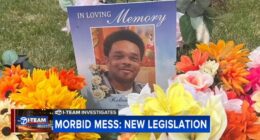Share this @internewscast.com
Nurses bowed their heads in silent tribute as a team of medical staff wheeled TJ Hoover toward the operating room, his eyes scanning frantically from wall to wall, from face to face.
His sister, Donna Rhorer, held his hand tightly, while his two young sons, aged eight and nine, watched the somber ‘honor walk’ unfold down the sterile corridor of Baptist Health hospital in northern Kentucky.
Hoover was being taken into surgery to have his kidneys and pancreas harvested for donation, despite being very much alive.
Just two days earlier, the 33-year-old had been found unresponsive and placed on life support after an accidental methamphetamine overdose.
At that time, representatives from the Kentucky Organ Donor Affiliates (KYDA), a non-profit organization managing transplant coordination in the state, approached Rhorer. They informed her that Hoover was an organ donor and requested her consent to remove the breathing tubes, which they believed were sustaining his life.
In an interview with the Daily Mail, Rhorer explained that she made the decision she thought her brother would have wanted—agreeing to end his life support.
Reflecting on that day, Rhorer said, ‘You’re losing a loved one, you’re grieving, you’re hoping that they pull through… but at the same time, it feels like you’re pressured to go ahead and kill them… for the organs.’
But TJ Hoover did not die, and KYDA staff – according to a blockbuster federal report – allegedly proceeded with plans to remove his organs, nevertheless.

Hoover (pictured in 2021) lives out his days under the care of his sister

But TJ Hoover (pictured with Rhorer in an undated image) did not die, and KYDA staff – according to a blockbuster federal report – allegedly proceeded with plans to remove his organs, nevertheless
Now an exclusive Daily Mail investigation has detailed Hoover’s October 2021 ordeal with new insights from Rhorer as well as two former KYDA employees turned whistleblowers, including one staffer who was in the operating room when Hoover’s surgery was halted at the last moment.
Among the Daily Mail’s most startling findings is that as Hoover lives out his days in the care of his sister, the former president and CEO of KYDA, Julie Bergin, is still working in organ procurement as an executive at an even larger organization and earning a reported $367,900 a year.
Hoover’s case became the focus of a comprehensive federal Health Resources and Services Administration (HRSA) investigation and discussed in a September Congressional hearing.
The government probe found a total of 73 instances of organ removal operations in Kentucky over the past four years that officials should have considered abandoning because patients had high or improving levels of consciousness. Most of those patients reportedly later died. Some, like TJ Hoover, survived. But not without enduring a living nightmare.
According to the government’s report, Hoover ‘showed clear signs of life at multiple points’ but KYDA’s staff ‘directed the organ recovery’ to ‘proceed.’
During a minimally invasive procedure to check Hoover’s heart function, his eyes reportedly opened and he began tracking movement around the room, a hallmark sign of neurological activity. Then, Hoover began ‘thrashing on the bed,’ according to the HRSA report.
The HRSA report cited a record kept by a KYDA staff member that read: ‘[Cardiologist] made comment “I am no neurologist but if [sic] I would most certainly call this purposeful movement and they should not have said that patient was not going to have a meaningful recovery with these reflexes.”‘ But the report notes there is ‘no documentation of discussions among [KYDA] staff’ at the time to reconsider the procurement operation, even as ‘hospital staff kept stating that this was euthanasia.’
Once in the operating room, tears rolling down his face, Hoover shook his head no, pulled his knees to his chest and showed visible signs of pain, according to notes taken by KYDA staff.
Still the operation was not stopped.
Hoover ‘periodically appeared aware of his surroundings,’ and then ‘2 doses of morphine sulfate,’ a powerful pain reliever with sedative properties, was administered, the report said.

Hoover’s case became the focus of a comprehensive federal Health Resources and Services Administration (HRSA) investigation and discussed in a September Congressional hearing (Pictured: Rhorer and Hoover in 2024)
Natasha Miller, a former KYDA employee in that operating room that day, October 29, 2021, told the Daily Mail that the procedure was only stopped 45 minutes later when a palliative care physician refused to go forward with the surgery.
‘It was obvious that the staff was extremely uncomfortable. [KYDA staff] stepped out of the [operating room] and [hospital physician] followed and stated that she felt that this was inhumane and unethical and she would not participate in this process,’ a KYDA staff note said.
Then, another whistleblower told the Daily Mail, KYDA staff were still directed to complete the organ procurement.
Nyckoletta Martin, a KYDA staffer, said she was on the phone with Miller, and overheard another KYDA employee named Courtney speaking to ‘KYDA administrators.’
Martin told the Daily Mail: ‘I could hear Courtney talking on the phone to KYDA’s admin, and she was just in tears. She was being told, “Find another doctor who will complete this case, because we’re going to complete the case.” And Court was like, “There are no doctors, there is nobody,” so at that point, they gave up.’
The HRSA report also highlighted other alleged misconduct, recounting several patient stories, all anonymous, in which family members said they felt pressured to consent to donations or were in no fit state to approve them.
In one case, a KYDA staffer allegedly insisted – inaccurately – that a donor’s registration was a ‘legally binding document’ that a family couldn’t override. In another, KYDA allegedly sought consent from a cognitively impaired ‘child-like’ brother of patient, only stopping when hospital staff intervened. A third case saw KYDA workers allegedly proceed with a donation discussion after witnessing a family member, later documented as ‘clearly inebriated’ and ‘high off of something,’ take psychoactive medication.
The blistering report concluded by noting ‘the prevalence of patient-level failures’ at KYDA and claimed that Hoover’s case was symptomatic of organization-wide mistakes that may have been occurred as recently as December 2024.
In a statement to the Daily Mail, Network for Hope (which was formed by a merger of KYDA and another organ procurement organization on October 1, 2024) did not respond to any specific allegations in this report. But Network for Hope CEO Barry Massa did say that they reviewed TJ Hoover’s case and ‘learned that while procedure was followed, there are improvements that can be made to various policies.’
‘Since our merger in October 2024,’ they added, ‘we have worked collaboratively with the US Department of Health and Human Services and the Health Resources and Services Administration to implement policies that support the betterment of the organ transplant system as a whole.’
Julie Bergin, former president and CEO of KYDA, is now President and COO at Network for Hope. And she, too, was mentioned in the HRSA report.
Julie Bergin (pictured), former president and CEO of KYDA, is now President and COO at Network for Hope

In an interview with the Daily Mail, Rhorer (left, with Hoover, right in 2024) said she did what she believed her brother would have wanted – and gave her approval to end his life
According to investigators, when the Organ Procurement and Transplantation Network (OPTN) – the organization that oversees the US organ donation system – first demanded documents about Hoover’s case KYDA appeared to stonewall.
Instead of providing medical records or communications, Bergin returned a one-page letter on Sept 20, 2024, writing: ‘The potential donor was treated following standard protocols… The proper guardrails were in place and worked to the expectations, policies, and procedures of all regulatory agencies… KYDA is satisfied and confident in the donation process for [TJ Hoover].’
HRSA, unsatisfied with Bergin’s response, compelled the OPTN to launch the formal investigation that ultimately resulted in the Congressional hearing in September.
In Bergin’s new role with Network for Hope, she earns $367,900 per year, according to ProPublica reporting.
Network for Hope told the Daily Mail that their ‘board determined the President and COO’s compensation at the time of our merger.’
All this is a very bitter pill for Donna Rhorer. ‘[TJ] is a shell of the person that he used to be,’ she told the Daily Mail.
Hoover’s life now, nearly four years after the ordeal, is filled with therapy appointments: physical, emotional, speech and occupational, a fight to reclaim fragments of his former self.
The damage he suffered – likely from a combination of his drug overdose and subsequent treatment – is permanent and progressive. Doctors suspect he is in the early stages of Parkinson’s, meaning his therapy is a lifelong battle, not for recovery, but to slow an inevitable decline.
His short-term memory is largely gone, yet, in cruel, fleeting moments, clarity breaks through, and he is consumed by survivor’s guilt, agonizing over why he lived when others did not.
The trauma, Rhorer said, has left him with a deep-seated terror of hospitals and doctors’ offices. His anxiety becomes unmanageable; a visceral reminder of what was done to him.
Hoover lives with the knowledge, on some level, that he was once on an operating table, aware enough to feel trapped in his own body and to fight for a life that others has seemingly given up on.











